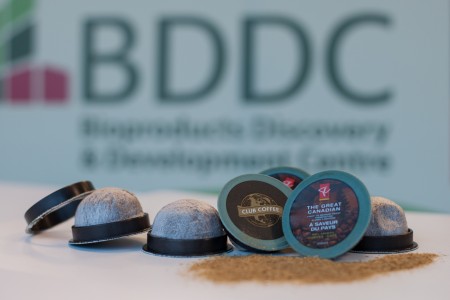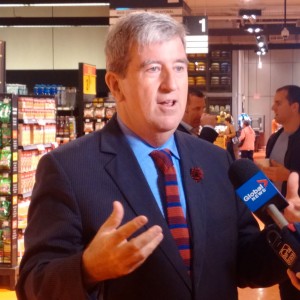Compostable single-serve coffee pods based on University of Guelph innovation will soon reach the shelves of a major Canadian grocery retailer, it was announced today.
Loblaw Companies Ltd. is launching President’s Choice single-serve coffee pods that are certified 100-per-cent compostable.
 The announcement was made in Toronto at an event attended by Glen Murray, Ontario minister of the environment and climate change, as well as officials from Loblaw and U of G.
The announcement was made in Toronto at an event attended by Glen Murray, Ontario minister of the environment and climate change, as well as officials from Loblaw and U of G.
“This new product is a great example of how the University of Guelph puts knowledge into action,” said Malcolm Campbell, vice-president (research).
“We use our discoveries to produce real solutions to real-life challenges — in this instance, helping people and the environment.”
The Toronto-based coffee roaster Club Coffee created the pods with support from U of G’s Bioproducts Discovery and Development Centre (BDDC).
The pods are made almost entirely from plant materials and reclaimed coffee bean skins. The compostable pods are compatible with most Keurig brewing systems.
A U of G team led by BDDC director Dr. Amar Mohanty developed a key component: the ring that holds the pod in place in a coffee brewer. It’s made with coffee chaff, the skin of the coffee bean that comes off during the roasting process. The University has filed a patent for the ring formula.

Made from plant-based resins, the coffee chaff ring and the entire single-serve pod are designed to be fully compostable. Competitive Green Technologies based in Leamington, Ont., made the resin for the pod’s ring.
Certified by the Biodegradable Products Institute (BPI), the largest independent certification organization for compostable products in North America, the pods meet international standards for compostability. Club Coffee is the first manufacturer to earn BPI certification for single-serve pods.
The number of used single-serve pods sent to landfills last year could have circled the Earth 13 times.
“This innovative coffee pod not only addresses issues of environmental sustainability but also helps reduce greenhouse gas emissions and dependence on non-renewable fossil fuels,” Mohanty said
Mohanty is a professor in the Department of Plant Agriculture and the School of Engineering, and holds the Premier’s Research Chair in Biomaterials and Transportation.
The BDDC uses renewable agricultural products as alternatives to petroleum-based sources to make products from car parts to storage bins to eco-friendly packaging materials.
The centre is supported by the University’s partnership with the Ontario Ministry of Agriculture, Food and Rural Affairs. BDDC funding has also come from the Ontario Ministry of Research and Innovation, the Natural Sciences and Engineering Research Council of Canada, Agriculture and Agri-Food Canada, the Federal Economic Development Agency for Southern Ontario, the Canada Foundation for Innovation, alumni and private partners including BMO Financial Group.